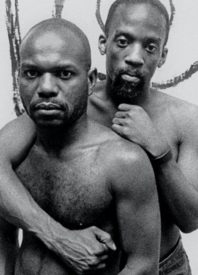
One of the opening scenes in Marlon Riggs’ Tongues Untied seems like one of of those dating ads where gay men had to leave a voicemail about what they’re looking for. The landline ads were, and I’m bragging here, way before my Manhunt days. Riggs’ version of those voice ads has him looking for someone politically compatible with him. This doesn’t seem like a normal sex ad, which makes it seem like he’s aiming for parody. But let’s not assume that we’re smarter than the past generations who only wanted sex, and what helped me debunk that was looking through Grindr.
There were many profiles with hashtags back in the summer, signaling that they don’t discriminate in the bedroom. But I only saw a profile with a hashtag on it this morning. One can otherwise discover their political compatibility with another person on whether or not they’re ‘lockdown bored’ or ‘staying home’. I compare this to my straight roommate who calls himself a lefty on his dating profile. And all of this makes viewers think of what Riggs would have thought of this new mix of politics and sex, if it was either a relief or if it was performative. I’ll connect this scene with another later in the film, but either way, the film is political as a whole.
Most of Tongues Untied is a testimonial of the pain that comes with growing up Black and gay during the late 20th century. Riggs turns his face towards his camera. He recounts, for instance, the names other Black people called him in discovering that he went to a mostly white school. He shows his full face while telling his side of the story, demonstrating the power he has either because of or despite of his pain. Meanwhile, he closes up on the mouths of the people reenacting the name calling. He amplifies those voices while disembodying them. It feels like a cop out to say that his visuals are up to interpretation. But there’s enough doublespeak here to hint at a playfulness although he’s possibly reopening old wounds to counteract other coping techniques.
Gay men of color have learned those techniques, acting them out subconsciously. But Riggs, along with his collaborator Essex Hemphill shows their visceral reactions to those slurs. Rigss juxtaposes the sorrow in Hemphill’s face with Eddie Murphy’s homophobic jokes. It’s hard to take Murphy seriously because of what most viewers know about him now. But Hemphill’s sadness makes viewers look back on their reactions when they’re on the receiving end or are witnesses to name calling. In playing those negative voices, Riggs might simply be showing those people’s true colors and how disappointing those colors are. Viewers feel above those people who resort to slurs, to free straight tongues.
There’s also something innately disturbing in remembering that there are those kinds of people out there. That there are people who savor on their hatred of others with different gender identities and sexual orientations. A hatred that forces minorities into tying their tongues. Anyway, that early scene with the sex ad reminds me of later ones where he shows out gay Black men. Shirtless or otherwise, they’re marching for their rights, a visual he juxtaposes with the sounds of a barbershop quartet singing about coming out. Personally speaking, I became politically aware after 2001, and my vision of the gay civil rights movement is Dan Savage. Savage is ok, but Riggs retroactively presents a different if more accurate history. People like Riggs had to untie their tongues for everyone in the LGBT2+ movement to speak freely.
Race, Sex & Cinema is still on Criterion. It’s a miracle I got to watch two movies in the same Criterion section but I make not promises.

